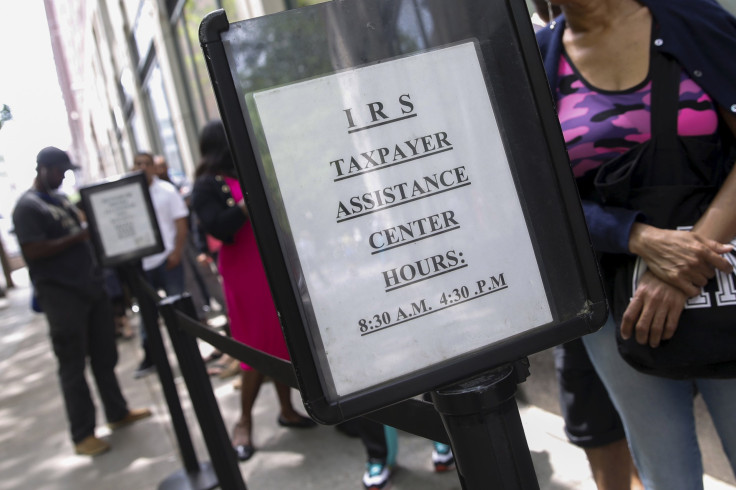Millennials Fear Tax Season, But Breaks And Youth-Friendly Policies Mean They Don’t Need To

W-2 — OMG — IRS — WTF? That series of panicky acronyms sums up what’s likely been going through young people’s minds this month while trying to figure out how to file their taxes ahead of a rapidly approaching deadline.
The widely disliked annual financial paperwork is particularly intimidating for the 83 million-person millennial generation, in part because they’re inexperienced with the United States’complicated tax laws and freelance more than any other age group. But money experts say taxes don’t have to be traumatic for millennials: They actually have several factors working in their favor this year. College-related deductions and online services can put young people in a good position to do their taxes — and, hopefully, demystify the process.
“No one tells you how complicated it’s going to be,” said Rus Garofalo, the owner of freelancer-focused tax preparation company Brass Taxes in Brooklyn, New York. “It’s this awkward feeling of ‘Am I going to get audited? Am I screwing myself?’ You're manipulating numbers that are directly applying to your life.”
A recent survey found Americans between the ages of 18 and 34 were the group most worried about their taxes, with 80 percent of them citing fear of making mistakes that leave them paying too much or getting too little back from the government.
A variety of factors could be causing the tax terror. Millennials, simply because of their age, have less history with income taxes. They have a do-it-yourself attitude that could discourage them from seeking professional tax help. And because they were raised during the Great Recession, they may actually know less than previous generations who grew up in households where parents typically had steady 9-to-5 jobs, Garofalo said.
"Everybody thinks everybody else understands it and just they don't understand it — which is just because nobody talks about money," he added. "There's just a limit to the amount of Googling we're going to do in order to find answers."
Well, if you're a millennial — or even an older American just nervous about interacting with the IRS — quit Googling. Just keep calm and read on.
First of all, your age or income may be low enough for you to skip filing taxes.
If you plan to file as a single person, were younger than 65 at the end of 2015 and had gross income less than $10,300, you generally don't have to file, according to the IRS' Publication 501. You're also typically OK if you're an under-65 dependent who's not blind and your earned income was less than $6,300 or unearned income was less than $1,050.
If you do have to file, good news! You have extra time this year.
The federal tax filing deadline this year for most Americans is Monday. Tax Day is usually April 15, but it gets pushed back to the next business day whenever Washington, D.C., is observing a holiday. Emancipation Day, recognized on April 16, falls on a Saturday this year — so the capital is celebrating Friday. That pushes Tax Day forward to Monday, April 18, according to Forbes.
And if you're in Maine or Massachusetts, which celebrate Patriots' Day on Monday, your deadline is Tuesday, April 19.
In all honesty, your taxes are probably not that complicated.
About 74 percent of millennials have never invested in the stock market, according to MarketWatch, and the average income of millennials ranges between about $18,000 and $43,000 annually depending on which state they live in, Business Insider reported. That means filing their taxes is probably not that hard, said Erin Lowry, the New York City-based creator of BrokeMillennial.com.
"There's no need to be afraid and no need to necessarily pay someone to do it," she said. "If you have very simple taxes — you just get one form from one employer and you're not doing anything on the side — it's super basic, super easy to file it yourself."

If you live on the internet, you can do your taxes there, too.
Lowry, 26, said she remembers the first time she filed her taxes. She was a college sophomore, and she had to go to the campus post office to get an IRS booklet and then fill out her paperwork by hand.
These days, however, millennials have several online options for filing taxes. Websites offering free tax services include TurboTax, H&R Block, Liberty Tax and Tax Slayer. They're not only intuitive, Lowry said, but will also check your math as you go.
"It's holding your hand," Lowry added. "You're really not going to screw it up."
You’re in a good position to take advantage of certain deductions, which can reduce your taxable income.
Amy Wang, the senior technical manager for tax advocacy at the American Institute of CPAs based in Washington, D.C., said millennials should look into student loan interest deductions, which are available for people whose modified adjusted gross income is less than $80,000. If you're in that category, you can reduce your taxable income by up to $2,500 in interest payments on higher education loans for you, your spouse or your dependents.
Wang also suggested checking out tuition and fees deductions, which can reduce taxable income by up to $4,000 depending on which school supplies you bought during the year. Higher education expenses can include room and board, textbooks or equipment.
There are also education tax credits that can reduce tax liability. "Oftentimes this is how you can get an additional refund," Wang said, naming the American Opportunity Tax Credit and Lifetime Learning Credit in particular.
You can get help for free.
Sophia Bera, a certified financial planner who runs Gen Y Planning, recommended millennials look to see if there's a Volunteer Income Tax Assistance site nearby. People who make less than $54,000 a year generally qualify for VITA help.
"Taxes are complicated, and you have every right to be a little nervous about them," she said. "It can be very, very helpful to have somebody on your team to help you navigate through that process."

If things get really bad, you can file an extension.
People often procrastinate on filing their taxes because they're worried about them or don't have their documents together. If you're guilty of this, and you're almost positive you're going to get a refund, go ahead and apply for an extension. The government will usually allow you six extra months to file.
Bera said there's no shame in the process — she herself did it one year. "Life happens," said the 32-year-old Austin, Texas, resident. "It's totally fine to file an extension. It does not negatively affect your credit. It does not affect anything."
However, an extension isn't an automatic OK to ignore your finances. If you owe the IRS money, you still have to send it — or a rough estimation — to the government this month. You could also end up paying late fees or interest, USA Today reported.
The truth is you’re probably not going to get audited.
Millennials are coming of age at a time when audit rates are low, said Liz Weston, a personal finance columnist at NerdWallet. The percentage of individual federal tax returns that resulted in an IRS audit recently hit its lowest point in the past 10 years: 0.84 percent.
Young people, whose salaries are typically low and don't draw much scrutiny, shouldn't fudge their numbers — but they shouldn't panic, either. They won't get a knock on the door from a financial agent ready to rip their life apart.
"If they make a mistake, typically the most they're going to get is a notice from the IRS correcting it," Weston said. "Unless you are out to commit fraud and you're trying to hide money from the government or evade taxes, you really don't need to [worry]."
Just don't skip filing your taxes completely. To borrow a catchphrase from Larry the Cable Guy, Weston said to "get 'er done."

There’s always next year.
Bobby Hoyt, who runs MillennialMoneyMan.com, said he spent years filing taxes with the goal of getting as big of a refund as possible. Then he realized that's not the best strategy for his lifestyle.
"I think that young people want that refund because it's like they can go on vacation, they can buy some cool stuff," said Hoyt, a 27-year-old former teacher in Houston. "I'm trying to minimize that so I can keep the most of my earned income so I can save and invest it the way I want to."
If doing this year's taxes is a nightmare, Hoyt said it might be a good time for millennials to revamp their finances. He recommended investigating adjusting the amount that's withheld from each paycheck and opening a retirement account. If you're a freelancer, start setting aside money every month to pay taxes each spring.
He added that people should form short-term, midterm and long-term goals. Taxes, as scary as they may seem, aren't going away.
"It's OK if you don't know it this year," Hoyt said. "Check out what happens and create a strategy for next year."
© Copyright IBTimes 2024. All rights reserved.






















